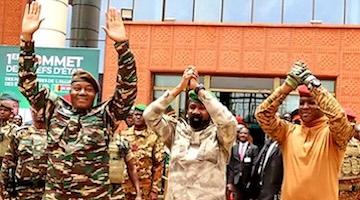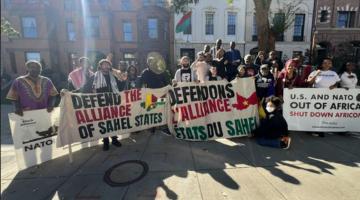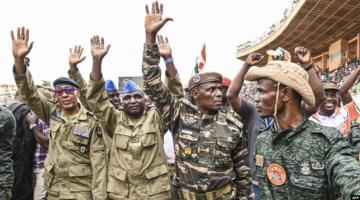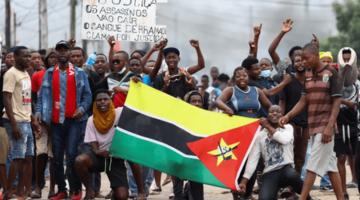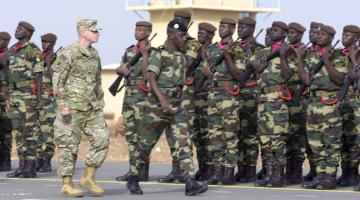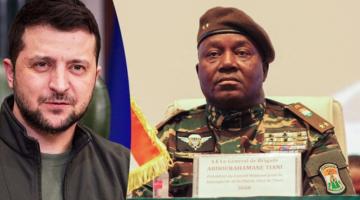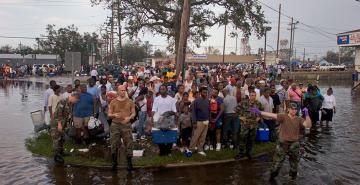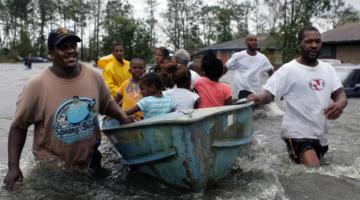The Taureg community protests drone strikes by U.S. AFRICOM in the region while holding a banner showing the photographs of their community members killed in a November 2018 lethal strike. (Photo: Courtesy of Reprieve)
A criminal complaint accuses a former commander at a U.S. airbase in Sicily of murder. But U.S. full spectrum dominance and its AFRICOM iteration are the true perpetrators.
This article was originally published in The Intercept.
In late November 2018, missiles obliterated three sport utility vehicles in North Africa.
“In coordination with the Libyan Government of National Accord (GNA), U.S. Africa Command conducted a precision airstrike near Al Uwaynat, Libya, November 29, 2018, killing eleven (11) al-Qaeda in the Islamic Maghreb (AQIM) terrorists and destroying three (3) vehicles,” according to an Africa Command, or AFRICOM, press release issued the next day. “At this time, we assess no civilians were injured or killed in this strike.”
Madogaz Musa Abdullah, the brother of one of the victims, says that’s impossible. “AFRICOM killed 11 people on the basis that they were terrorists, but these young men were completely against terrorism,” he told The Intercept. “They were killed without evidence. I challenge AFRICOM to produce evidence that even one of these men was on a U.S. target list.”
On Friday, Abdullah, along with a spokesperson for his ethnic Tuareg community and representatives of three nongovernmental organizations, filed a criminal complaint against the former Italian commander at the U.S. air base in Sigonella, Sicily, seeking accountability for his role in the killings. They have asked the public prosecutor’s office in Siracusa, where the base is located, to investigate and prosecute Col. Gianluca Chiriatti and other Italian officials involved in the attack for murder.
“Death is a fact that we cannot deny but the injustice of eleven people being killed, accused of terrorism despite the fact they were innocent, affected us deeply especially when we had to bury them in a common grave,” said Abdullah, in a sworn statement accompanying the complaint. “This, and the hospitals refusing to issue death certificates, impacted the families of the victims psychologically, especially the mothers and fathers of the victims. We are devastated.”
According to legal documents shared exclusively with The Intercept and Italy’s Avvenire, most of the men killed were members of the Libyan armed forces; several had previously fought against Al Qaeda or even alongside the United States when it battled the Islamic State in the city of Sirte two years earlier.
The men were armed and heading from their homes in Ubari, a village in southwest Libya, toward the Algerian border to assist fellow community members who had been attacked by a gang with whom they were feuding over abandoned construction equipment. “The eleven victims were not members of Al Qaeda or any other terrorist organization and were not combatants: they were travelling to retrieve an excavator that was the subject of a dispute with another group,” reads the complaint. “These murders, committed outside of any armed conflict and therefore qualifying as an extraterritorial law enforcement operation, are in direct contrast with Italian and international regulations on the use of lethal force.”
Civilian harm allegations stemming from the attack were referenced in the Defense Department’s 2018 annual report on civilian casualties and deemed “not credible” in the following year’s report. Despite committing hundreds of airstrikes in Libya, AFRICOM has never substantiated a report of a civilian casualty there.
More than three years after the November 2018 strike — despite numerous media reports of civilian casualties from the attack, coverage of protests by the Tuareg community in Ubari, and assurances from then-Libyan Prime Minister Fayez al-Sarraj that he would forward a letter from the families to the U.S. government — AFRICOM stands by its initial assessment. “We are aware of the reports of civilian casualties from this strike,” AFRICOM spokesperson Kelly Cahalan told The Intercept. “U.S. Africa Command followed the civilian casualty assessment process in place at the time and determined that the reports were unsubstantiated.”
“Unfortunately, this strike isn’t unique. It’s a story that we’ve heard again and again and again. It isn’t only that bad intelligence led to a bad strike that killed civilians. Even more damaging is the complete lack of engagement afterwards,” said Jennifer Gibson, a human rights lawyer and project lead on extrajudicial killing at Reprieve, one of the NGOs — along with the European Center for Constitutional and Human Rights and Italy’s Rete Italiana Pace e Disarmo — that filed the criminal complaint. “There’s been no attempt to properly investigate. No attempt to engage with the community for more than three years. And no attempt to learn from the mistake that was made. This all means that the cycle will repeat and, in the future, more civilians are going to die.”
From Iraq to Somalia and from Syria to Yemen, the U.S. military regularly undercounts civilian casualties, according to family members of victims, experts, and humanitarian groups that independently investigate claims. For years, exposés by journalists and NGOs have routinely been necessary to push the Department of Defense to investigate attacks and admit to killing civilians.
CENTCOM reported, for example, that between August 2014 and March 2017, U.S. attacks killed at least 352 civilians in Iraq and Syria. But a 2017 investigation by journalists Azmat Khan and Anand Gopal of nearly 150 U.S.-led coalition airstrikes targeting ISIS in Iraq found that 1 in 5 of the strikes killed civilians, a rate more than 31 times that acknowledged by the coalition. Last year, a New York Times investigation revealed that a 2019 airstrike in Baghuz, Syria, killed up to 64 noncombatants and was obscured through a multilayered cover-up. A separate 2021 Times investigation of 1,300 reports of civilian casualties found that the U.S. air war in the Middle East was “marked by deeply flawed intelligence, rushed and often imprecise targeting, and the deaths of thousands of civilians, many of them children, a sharp contrast to the American government’s image of war waged by all-seeing drones and precision bombs.” These latter two investigations followed intense media coverage of an August 2021 drone strike in Kabul, Afghanistan, that the Pentagon initially insisted was a “righteous strike” before admitting that it killed 10 civilians, seven of them children.
A 2020 study by researchers from the Center for Civilians in Conflict and the Columbia Law School Human Rights Institute of 228 U.S. military investigations of civilian harm in Afghanistan, Iraq, and Syria from 2002 to 2015 found interviews with civilian witnesses were conducted in just 21.5 percent of cases and site inspections carried out just 16 percent of the time.
AFRICOM offered no details about its review of the November 2018 attack. “The command’s assessment process draws from information from reliable and layered intelligence sources and classified operational reporting which are not available to the public,” Cahalan, the AFRICOM spokesperson, told The Intercept. “This can contribute to perceived discrepancies between the command’s results and those of others.”
“The U.S. military no longer interviews victims and witnesses, choosing instead to rely on their own intelligence information that helped develop strikes that led to civilian deaths,” said Marc Garlasco, once the chief of high-value targeting at the Pentagon and now the military adviser for PAX, a Dutch civilian protection organization. “By relying on their own intel, instead of including civilian perspectives, the U.S. is reinforcing the findings that led to the target engagement in the first place which creates a vicious cycle of target development, bombings, and civilian deaths instead of lessons learned that would inform the targeting process and improve civilian protection.”
Members of the Tuareg community in Ubari have repeatedly called for an independent and transparent investigation of the 2018 strike. They have also consistently maintained that not only did none of the 11 men killed have terrorist ties, but also that most had served in the military of the United Nations-backed and U.S.-allied Government of National Accord, or GNA, which made them mortal enemies of Al Qaeda and ISIS. “Musa Ala al-Tuni was a field commander in the armed forces of the GNA army and a member of al-Bayan al-Marsous, the division of the GNA army which fought alongside the United States to drive ISIS out of Sirte,” the community spokesperson, a former employee of the United Nations Development Program who brought the criminal complaint and whose name is being withheld to protect his safety in Libya, said in a statement attached to the criminal complaint. “The [Libyan] head of the Sirte operation said publicly that it was impossible for Musa to be associated in any way with terrorist organizations.”
Madogaz Musa Abdullah’s younger brother, Nasser, was also a member of the GNA and had been a security officer for former Prime Minister Abdullah al-Thani. Abdullah provided Reprieve with Nasser’s military identification card. “Most of the people with my brother in the car at the time were well known and respected as soldiers in the national Armed Forces,” he said in a sworn statement. And Al Qaeda in the Islamic Maghreb, which normally memorializes the deaths of its fighters, not only failed to announce the deaths of the 11 men, but also publicly rejected any affiliation with the victims.
AFRICOM, which became fully operational in 2008, did not provide The Intercept with a count of all airstrikes it has conducted in Libya, advising that a Freedom of Information Act request would be necessary for information prior to 2016. (Such requests can take years to process and often yield no useful information.) But a 2018 Intercept investigation found that the U.S. military had conducted approximately 550 drone strikes in Libya over the previous eight years, including 241 drone strikes launched from Sigonella in 2011 alone. AFRICOM conducted seven declared airstrikes in Libya in 2017, six in 2018, four in 2019, and none since.
In early 2021, the Biden administration imposed temporary limits on drone strikes and commando raids outside of conventional war zones. The White House launched a review of such missions and began writing a new “playbook” to govern counterterrorism operations. That policy, which was reportedly slated to be released last September, has been delayed as the White House has dealt with fallout from the chaotic U.S. withdrawal from Afghanistan and a stream of revelations about past civilian casualty incidents.
In January, Defense Secretary Lloyd J. Austin directed the military to take steps to prevent civilian deaths and improve how it investigates and acknowledges civilian casualty claims. “[W]e can and will improve upon efforts to protect civilians,” Austin wrote in a two-page memorandum. “The protection of innocent civilians in the conduct of our operations remains vital to the ultimate success of our operations, and as a significant strategic and moral imperative.”
PAX’s Garlasco expressed cautious optimism regarding the proposed reforms. “I am cautious because we have been burned in the past by unfulfilled promises,” he told The Intercept. “I am optimistic because I have been part of an NGO consortium engaging the Pentagon on the new policy and I am hopeful they will take on our recommendations.”
The end of the U.S. war in Afghanistan and Russia’s invasion of Ukraine, he said, offered the U.S. an opportunity. “After 20 years of war and countless civilian deaths, I hope this time is different and I hope the U.S. will become a champion of the protection of civilians,” he explained. “We owe it to the countless dead civilians of the past two decades to change how we wage war. Russia is showing us how not to do it. Now it is time for the U.S. to lead.”
With American courts effectively closed to victims and survivors of errant U.S. airstrikes, family members are seeking accountability in Europe. Last year, the nephew of a drone strike victim filed a complaint with Germany’s highest court regarding the role of a U.S. military base in Ramstein, Germany, in the drone war in Yemen. While that legal action seeks to alter policy going forward, Friday’s criminal complaint addresses whether Chiriatti, then the commander of Italy’s Sigonella air base, fulfilled his duty to prevent U.S. military operations contrary to Italian law, or those that clearly endanger life.
When Abdullah received a call that Nasser had been killed, he was stunned. He drove for hours to reach the wreckage of the cars. They were destroyed, and the bodies were burned beyond recognition. “What I saw was so terrible, I can’t even describe it,” he said.
“This community is saying to the Italian government and the American government that enough is enough. They’re calling it what it is. Under the Italian domestic code, this strike amounts to murder,” said Reprieve’s Jennifer Gibson. “But what communities in Yemen and Libya are also saying to European governments is that you’re also responsible if you facilitate the drone program. If Ramstein can only carry out lawful strikes, there are no more strikes in Yemen. If the drones can’t launch from Sigonella, they don’t hit this community in Ubari.”
While AFRICOM is confident that the 11 men it killed near Al Uwaynat were “terrorists,” Cahalan, the spokesperson, said that if presented with new or additional information, the command “would reassess our findings.”
Abdullah wants more than that. “We ask the American people to stand against AFRICOM killing us,” he said.
He wants Nasser’s name cleared. “When they accuse you of being a terrorist and kill you for it, they take away your dignity. The person closest to my heart was accused of terrorism, but he was innocent. We want our dignity restored,” he told The Intercept. “We want justice.”
Update: April 4, 2022
This article has been updated to include the names of two additional NGOs that filed the criminal complaint seeking accountability for the deaths of 11 Libyans in a 2018 U.S. airstrike.
Nick Turse is a contributing writer for The Intercept, reporting on national security and foreign policy. He is the author, most recently, of "Next Time They’ll Come to Count the Dead: War and Survival in South Sudan," as well as "Tomorrow's Battlefield: U.S. Proxy Wars and Secret Ops in Africa," and "Kill Anything That Moves: The Real American War in Vietnam." He has written for the New York Times, Los Angeles Times, San Francisco Chronicle, The Nation, and Village Voice, among other publications. He has received a Ridenhour Prize for Investigative Reporting, a James Aronson Award for Social Justice Journalism, and a Guggenheim Fellowship. Turse is a fellow at The Nation Institute and the managing editor of TomDispatch.com.


